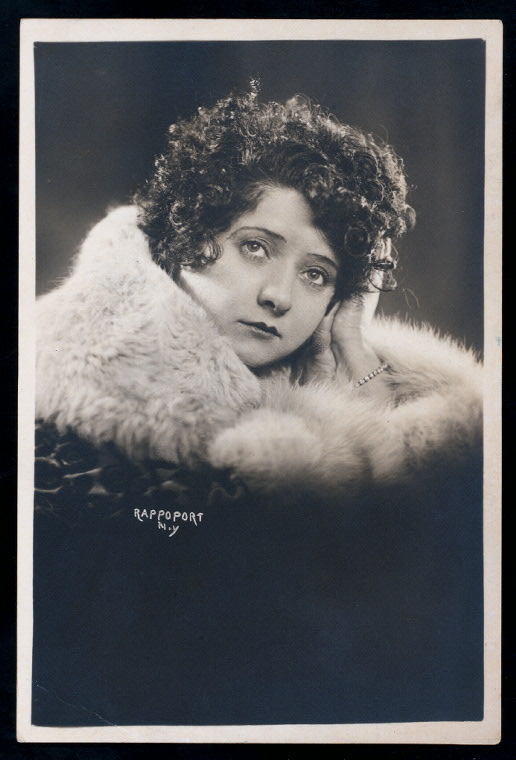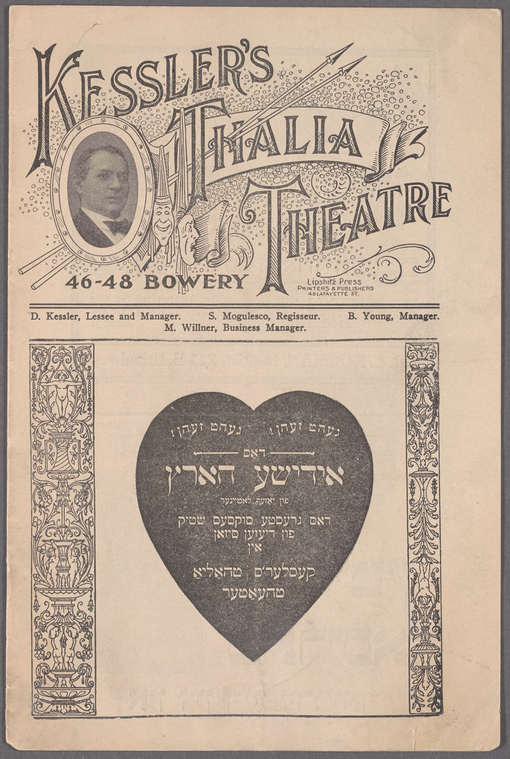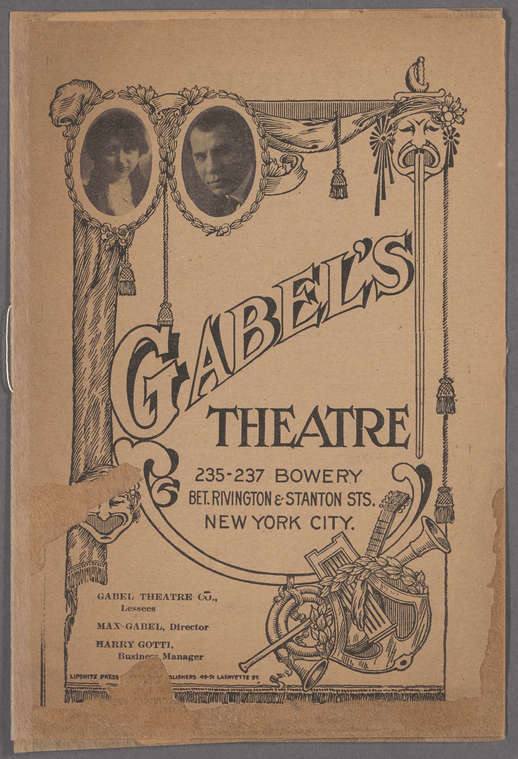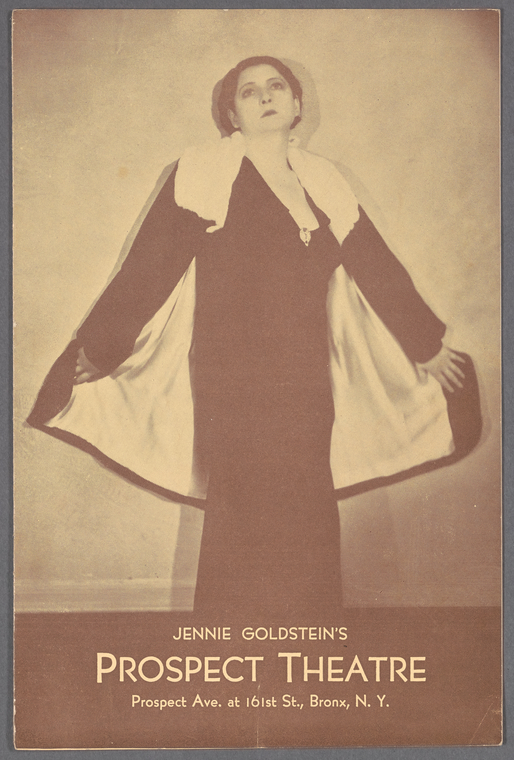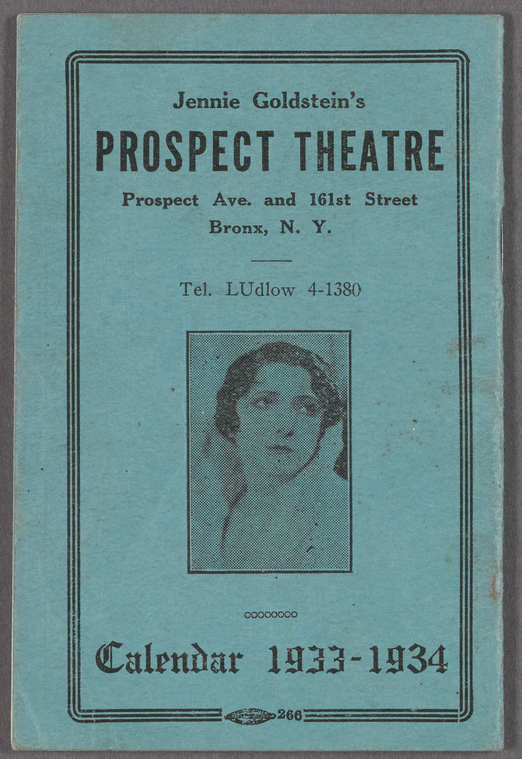Yiddish Drama Queen: Jennie Goldstein in Pictures
Child star, singer, melodrama queen, comedienne, lyricist, composer, recording artist, theater proprietor, and world traveler—Jennie Goldstein had a long and varied career on the Yiddish stage and beyond.
On the 59th anniversary of her death, here is our illustrated tribute to Goldstein (1896-1960).
"I want to die! I can’t live!" screamed Goldstein in one of her melodramatic roles, a Yiddish theatergoer recalls, but Goldstein had a long and varied career beyond just melodrama, with much of it on the Yiddish stage.
Early Life
Born and raised on the Lower East Side, young Jennie debuted on stage at age 6 at the Windsor Theatre, 45-47 Bowery.
She quickly became a crowd favorite, and soon had a steady job paying $9 a week.
In the 1904 song On the other side, or Oyf yener zayt, written by Sigmund Mogulesco, she sang ,"Because of money, you rob poor people… you’ll be punished in the grave, on the other side."
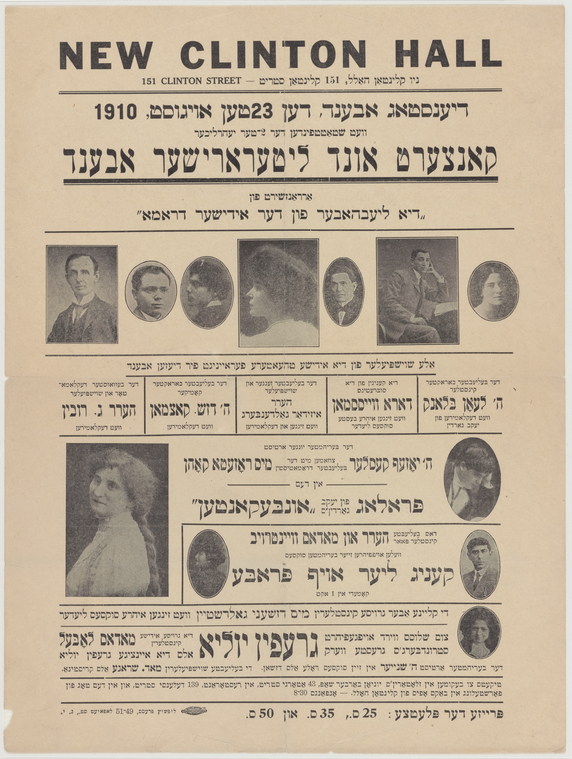
At age 13, Jennie had her first grown-up role as Lidia in Joseph Latayner’s popular melodrama Dos Idishe harts (The Jewish Heart).
As a teenager, she became a successful vaudeville performer, advertised as "the small but great artist, Miss Jennie Goldstein, who will sing her success songs" at a Concert and Literary Evening, August 23, 1910.
Through vaudeville, she met and married the actor, playwright and producer Max Gabel (L. Gebel) (1877-1952).
Gabel wrote melodramas and Jennie starred in them, including A meydels holem (A girl’s dream) (1914), Heylige libe (Holy Love) (1919), and Vos veln menshen zogen? (What Will People Say?) (c.a. 1925).
A Trailblazer in Yiddish Theatre
The sheet music from What Will People Say? includes the song "Meydel, vest nokh gliklekh zayn"—or "Girl, You’ll Be Lucky Yet"—with words and music by Jennie Goldstein.
Goldstein became one of the few women in Yiddish Theater to write lyrics and music for songs that she performed on stage and recorded commercially. Many of her audio recordings are now available online, as is her published sheet music.
During her long career, Goldstein traveled throughout the U.S., Europe, and South America. In 1927, she celebrated 25 years on the stage with a banquet at the Pennsylvania Hotel and a diamond tiara. Teater un Kunst was one of many periodicals to mark her jubilee, creating a visual montage of some of her roles.
Entering Theatre Ownership and Feature Film
After divorcing Gabel in 1930, Goldstein operated her own theaters, an uncommon practice for Yiddish actresses at the time, in a business dominated by male-owned venues. Her ventures included the Prospect Theater in the Bronx, and the National Theatre in Manhattan.
Goldstein adapted and starred in the 1938 film, Two Sisters, about a self-sacrificing older sister who is betrayed by her younger sibling.
During World War II, Goldstein successfully reinvented herself as a comic actress.
Florida Atlantic University
Goldstein also recorded successful comedy albums, incorporating a more modern sound and plenty of knowing, bilingual humor.
Florida Atlantic University
Florida Atlantic University
Goldstein also performed on television, and on Broadway in The Number by Arthur Carter and Camino Real by Tennesee Williams. While working on a television program for CBS, Goldstein fell ill and died on February 9, 1960.
She is buried in Mount Hebron Cemetery in Flushing, Queens, New York, in the plot of the Yiddish Theatrical Alliance. Her star adorns the Yiddish Theater Walk of Fame on Second Avenue.
Jennie Goldstein’s nearly-six-decades-long career spanned tragedy, comedy, and continents, and her legacy lives on through a multitude of research resources.
Further research
Search the NYPL catalog for Jennie Goldsetin sheet music, photographs and recordings.
Images
NYPL Digital Collections
Museum of the City of New York
Audio
Recorded Sound Archive, Florida Atlantic University
Video
Tsvey Shvester (National Center for Jewish Film)
Sheet music
New York Public Library
Library of Congress
Plays
Read E-Books with SimplyE
 With your library card, it's easier than ever to choose from more than 300,000 e-books on SimplyE, The New York Public Library's free e-reader app. Gain access to digital resources for all ages, including e-books, audiobooks, databases, and more.
With your library card, it's easier than ever to choose from more than 300,000 e-books on SimplyE, The New York Public Library's free e-reader app. Gain access to digital resources for all ages, including e-books, audiobooks, databases, and more.
If you don’t have an NYPL library card, New York State residents can apply for a digital card online or through SimplyE (available on the App Store or Google Play).
Need more help? Read our guide to using SimplyE.
